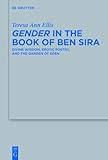Gender in the Book of Ben Sira : Divine Wisdom, Erotic Poetry, and the Garden of Eden / Teresa Ann Ellis.
Material type: TextSeries: Beihefte zur Zeitschrift für die alttestamentliche Wissenschaft ; 453Publisher: Berlin ; Boston : De Gruyter, [2013]Copyright date: ©2013Description: 1 online resource (290 p.)Content type:
TextSeries: Beihefte zur Zeitschrift für die alttestamentliche Wissenschaft ; 453Publisher: Berlin ; Boston : De Gruyter, [2013]Copyright date: ©2013Description: 1 online resource (290 p.)Content type: - 9783110330793
- 9783110330892
- 229.406 22/ger
- BS1765.53
- online - DeGruyter
- Issued also in print.
| Item type | Current library | Call number | URL | Status | Notes | Barcode | |
|---|---|---|---|---|---|---|---|
 eBook
eBook
|
Biblioteca "Angelicum" Pont. Univ. S.Tommaso d'Aquino Nuvola online | online - DeGruyter (Browse shelf(Opens below)) | Online access | Not for loan (Accesso limitato) | Accesso per gli utenti autorizzati / Access for authorized users | (dgr)9783110330892 |
Browsing Biblioteca "Angelicum" Pont. Univ. S.Tommaso d'Aquino shelves, Shelving location: Nuvola online Close shelf browser (Hides shelf browser)

|

|

|

|

|

|

|
||
| online - DeGruyter Modern Jewish Scholarship in Hungary : The ‚Science of Judaism‘ between East and West / | online - DeGruyter Whitehead's Pancreativism : The Basics / | online - DeGruyter Kritische Gesamtausgabe. Band 18, Briefe I (1884–1894) / | online - DeGruyter Gender in the Book of Ben Sira : Divine Wisdom, Erotic Poetry, and the Garden of Eden / | online - DeGruyter Die literarische Funktion von Kleidung in den Íslendingasögur und Íslendingaþættir / | online - DeGruyter Weisheit im Widerspruch : Studien zu den Elihu-Reden in Ijob 32-37 / | online - DeGruyter Euripides' "Alcestis" : Narrative, Myth, and Religion / |
Frontmatter -- Acknowledgements -- Table of Contents -- Chapter 1. Gender and Taxonomies -- Chapter 2. Gender and Impersonal Speech -- Chapter 3. Divine Female(s) -- Chapter 4. Human Females -- Chapter 5. Human Female, Biblical Females -- Chapter 6. The Discourse of Gender in the Book of Ben Sira -- Appendix: Lexical Studies and Annotated Translations -- Select Bibliography -- Index of Modern Authors
restricted access online access with authorization star
http://purl.org/coar/access_right/c_16ec
Gender in the Book of Ben Sira is a semantic analysis and, also, an investigation of hermeneutical pathways for performing such an analysis. A comparison of possible Greek and Hebrew gender taxonomies precedes the extensive delineation of the target-category, gender. The delineation includes invisible influences in the Book of Ben Sira such as the author’s choices of genre and his situation as a member of a colonized group within a Hellenistic empire. When the Book of Ben Sira’s genre-constrained invectives against women and male fools are excluded, the remaining expectations for women and for men are mostly equivalent, in terms of a pious life lived according to Torah. However, Ben Sira says nothing about distinctions at the level of how “living according to Torah” would differ for the two groups. His book presents an Edenic ideal of marriage through allusions to Genesis 1 to 4, and a substantial overlap of erotic discourse for the female figures of Wisdom and the “intelligent wife” creates tropes similar to those of the Song of Songs. In addition, Ben Sira’s colonial status affects what he says and how he says it; by writing in Hebrew, he could craft the Greek genres of encomium and invective to carry multiple levels of meaning that subvert Hellenistic/Greek claims to cultural superiority.
Issued also in print.
Mode of access: Internet via World Wide Web.
In English.
Description based on online resource; title from PDF title page (publisher's Web site, viewed 28. Feb 2023)


